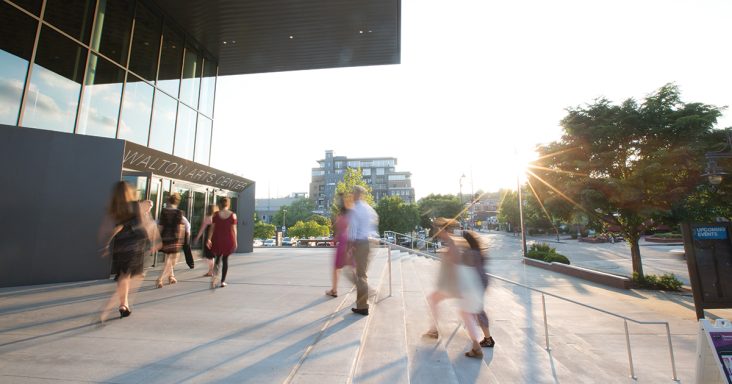Recent study illustrates how the arts help power Northwest Arkansas’ economy
by December 10, 2023 7:58 am 879 views

Patrons head inside the Walton Arts Center in downtown Fayetteville.
The Arts & Economic Prosperity 6 (AEP6) study, released in October, shed some light on the profound economic influence of nonprofit arts and culture organizations in the region.
For its efforts, Northwest Arkansas can take a curtain call.
Researchers determined that the region’s nonprofit arts and culture industry and their devoted audiences generated $232.6 million in economic activity in 2022. New reports by the national nonprofit Americans for the Arts included the findings.
The study was completed in conjunction with Northwest Arkansas nonprofit Creative Arkansas Community Hub & Exchange (CACHE), Arkansas Arts Council and Arkansans for the Arts.
Northwest Arkansas’ economic impact breaks down into $157.4 million in organizational spending and $75.2 million in event-related spending by attendees. Notably, the economic surge translated into supporting 3,434 jobs and generating $35.2 million in tax revenue.
Jeannette Balleza Collins, CACHE’s board co-chair, said the report is a reminder of how critical the arts and culture industry is.
“The data underscores the creative power of the arts to accelerate a common sense of belonging and stoke economic vibrancy, all the while highlighting how diverse representation makes Arkansas stronger.”
In Arkansas, the nonprofit arts and culture industry generated $306.4 million in economic activity in 2022.
Nationally, the AEP6 study showed that America’s nonprofit arts and culture sector is a $151.7 billion industry, supports 2.6 million jobs and generates $29.1 billion in government revenue.
Arts and cultural activity in 373 communities and regions representing all 50 states, Washington, D.C., and Puerto Rico were included in the multi-year study. The study areas ranged in population from 4,000 to 4 million and represented rural, suburban and urban communities.
To complete the national study, researchers and their local and state research partners collected expenditure and attendance data from arts and culture organizations and their attendees to measure total industry spending.
Americans for Prosperity conducts the study approximately every five years. AEP6 is the first study to include Arkansas.
“The state of arts and culture in Arkansas is strong,” said Jean Lacefield, Arkansans for the Arts’ board president. “The Arts and Economic Prosperity 6 study backs up, with data, what we already knew. When speaking to our elected lawmakers, government officials, and community leaders, being able to reference the real impact of the arts and culture and adjacent industries is vital.
“This report strengthens Arkansans for the Arts’ narrative that we must increase and continue to support public funding for arts and culture, including artists and arts education.”
A VIABLE ECONOMY
CACHE was one of 42 nonprofit arts and culture organizations in Northwest Arkansas that provided the financial and attendance information necessary for the analysis. Karen Castleman led the organization’s statewide data collection effort, which included input from 114 organizations.
She said the study’s findings are just the tip of the iceberg.
“Arts spending doesn’t just support the artists that you see on stage or whose work you see in a gallery,” said Castleman, the dance and event manager for CACHE Studios, an artist community and creative space in Bentonville. “There’s a whole industry of jobs that support that product, like lighting technicians or audio technicians, operations managers, marketing and finance staff.”

Castleman has over 20 years of experience as a professional dancer, educator, choreographer and community leader. She relocated with her husband, a visual artist, from Chicago to Northwest Arkansas just after Crystal Bridges Museum of American Art in Bentonville opened in November 2011.
“We came with a pioneering spirit,” she recalled. “We anticipated the backfill of arts and culture activity that would grow in response to the large investment made of a significant museum being here. And we’ve seen that.”
Castleman noted the ripple effects illustrated in the AEP6 findings. When people attend arts and cultural events, they also dine out at restaurants, pay for parking or transportation, enjoy dessert or a drink after the show and return home to pay for child or pet care. Attendees at arts events spent an average of $27.34 per person with local merchants beyond the cost of admission. That number more than doubles ($63.33) for nonlocal attendees (outside of Benton and Washington counties).
Jill Wagar, a member of the founding executive team and a senior director of Crystal Bridges, is also the director at the Momentary, a Crystal Bridges sister organization in Bentonville featuring contemporary arts and an entertainment venue.
She said the two venues will welcome about 850,000 patrons this year, about 40% of whom will travel from out of state.
“Arts and culture are driving people [to Northwest Arkansas],” she said. “When they come for tourism, they’re spending dollars here. They are staying here and investing in our community.”
She offered another anecdote about license plates to illustrate Crystal Bridges’ attraction as a tourist destination.
“I would often play the license plate game [driving] through the parking lot, and in one instance, I got up to 32 different states,” she said. “Guests are making Crystal Bridges a very purposeful destination on their route across America.”
Other findings of the Northwest Arkansas AEP6 report include:
- 12% of attendees are nonlocal visitors who traveled from outside Benton and Washington counties.
- 87.4% of nonlocal attendees reported that the primary purpose of their visit was specifically to attend the performance, event, exhibit, venue or facility where they were surveyed.
- 41.4% of attendees who live in Benton and Washington Counties said they would have “traveled to a different community to attend a similar arts or cultural activity.”
- 92% said they would “feel a sense of loss if that activity or venue was no longer available.”
- 91% said the venue or facility where they were surveyed is “an important pillar for me within my community.”
“Arts and culture organizations events make good neighbors and community members,” Castleman said. “They keep local dollars in the community and bring in business from visitors who come for those events. They create a sense of pride and belonging in the community.
Castleman said the report and its information should show clearly that continued advocacy and support of the arts — even in a challenging environment — is critical.
“It’s important to acknowledge that this is an industry that needs to be perpetually encouraged and invested in,” she said. “It’s possible to see vibrant communities and great arts opportunities and think, ‘Well, we’ve got that nailed down. Let’s move on to some other interests.’
“The numbers demonstrate a viable economy here of arts and culture that contribute to our overall well-being and quality of life. Continued investment also equals a ripple effect of continued economic growth in other areas.”
